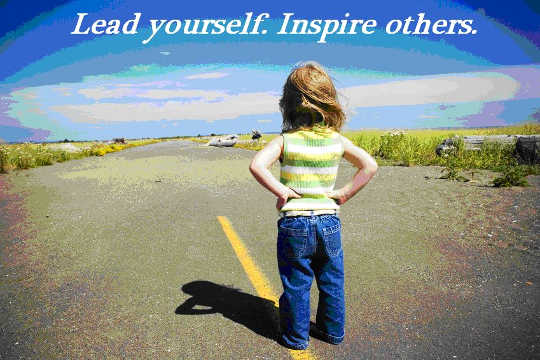
Many people convince themselves that they "have to" know so much, do so much, and be capable of so much. Seeing life as a series of "have to's" can be destructive. In reality, we don't have to do anything. On the contrary, we choose to do everything. If, in fact, you were governed by "have to's," you would be renouncing all responsibility for your life. Taking full responsibility for your existence on Earth gives you the key to recognizing your freedom of choice.
Of course, consequences follow from our decisions, and become apparent as we actively make choices. If we decide not to choose, there will be consequences nonetheless. Taking a step back from our lives lets us see that what we are, and where we are, results from the choices, conscious or not, that we've made along the way. That's why it's so important to try to be mindful of our choices. Take a moment now to give yourself the freedom to choose, and then think about how it would feel to be without it. What are your choices?
At the point where emotions interact with thought -- where a good mood leads you to think positively -- you can expect emotional intelligence to arise. You need to tap this emotional intelligence to make better choices, which create a better life.
Giving yourself the gift of choice can be overwhelming, especially if you're not in the habit. To help yourself, try to remember your happiest moments. Start this journey into the past by searching for five joyful memories. Once you identify them, dig a little deeper and consider why they made you happy. I promise that by doing this exercise you'll uncover new strength and an ability that will illuminate a goal.
Take care, though, not to be swayed by the events in your life that others deem "successful" or "exciting." It's dangerous to let other people's approbation define happiness for you. Instead, focus on those moments in your life that gave you the most pleasure, regardless of others' reactions.
When you've taken time to find out what you really like to do, the next step is to better understand why it makes you happy. Knowing will help you develop goals that fit your true nature. Aligning your passions with your goals produces a powerful energy that permeates your entire life.
Understanding and giving intention to your goals engenders a depth of meaning that creates a whole that's greater than the sum of its parts. If you feel you've lost the inner fire that propels you along, try to chart a new path for yourself.
Knowing that we have to get up and pay our bills or take out of the garbage isn't what makes us jump happily out of bed every morning. Our goals do that. Goals have to be rich and attractive enough to hold our attention. Psychologists often say that we should have realistic goals that are in proportion to our abilities. This might be true with respect to some goals, but I encourage you to grant yourself the luxurious pleasure of exciting, ambitious dreams. Dare to surpass the confining limits that you yourself have set. Let go of your inhibitions, and reach for a goal that makes your heart sing and your blood run faster in your veins.
Do you dare to achieve your goal? Do you care what other people say? Do you care if they laugh, or gloat over the fact that you didn't succeed? Remember that this isn't about the rest of the world, it's about you. Never abandon a goal that resonates deeply in your heart. That's the same as saying "No" to life. Don't give up on anything that really excites you, even if it looks impossible at first. And don't underestimate the tremendous power that comes from within when you truly believe in your goal and make a commitment to achieving it. That is when you can do the "impossible."
The Rocking Chair Test
Imagine yourself when you're old, sitting in your rocking chair, a wool blanket covering your knees. Think of the joy you'll have remembering all the things you dared to do and say, and the choices you dared to make because you took control of your life. Now remember that being true to yourself is the same as being true to others.
Once, I attended a dinner for Fred, whose firm was honoring him for fifty years' loyal service. As Fred sat facing me, I felt great respect for his contribution and politely asked, "Have you been happy these fifty years?" His unhesitating reply was a shock: "Not for a minute."
I wondered how that could have been possible. "But wasn't there anything you liked about your job during all this time?" I asked. Fred told me that he had spent some time doing carpentry and had really enjoyed it, so I asked why he hadn't pursued that kind of work. He replied that he'd tried once but it hadn't worked out.
Once! Only once! Why not a hundred times? I thought to myself. But then I reminded myself that these choices weren't mine to make; they were Fred's, and his alone. He had the right to choose as he wished, because his life was his responsibility and no one else's. As I sat staring at his hands, which were obviously made for carpentry, he perceived my disappointment. "Don't be so sad," he said. "I've just bought myself a carpenter's bench."
Think for a moment about all the people in the world who died without ever having chosen to buy themselves their carpenter's bench! When we believe strongly that something is possible, it becomes possible. If we see only impossibility, then that's what we guarantee ourselves. It's been said that perception is one hundred percent of reality. If we believe we're too young, then we are too young; if we think we're too weak, we are too weak. We need to be consciously aware of how we choose to view the world, because that's the reality in which we put ourselves.
It was a crucial day when I realized that my thoughts control my life. I had no money when I began my professional journey twenty years ago, but I believed that if I could see my goal clearly enough and wanted it badly enough, I'd be able to achieve it. The hardest part was being honest enough with myself to dare admit out loud what I was lacking. Honesty with ourselves can be difficult if we're out of practice; we need to be completely truthful and admit to what we really want.
Resist that hesitation you feel when you look around and see that no one in your family or your neighborhood has ever done what you want to do. Avoid the trap of believing that you won't succeed just because no one else has. You are unique; no one else can do what you can do the way you can do it. No one else can judge whether your goals are realistic. They can never be in your shoes, and they can never know what you can achieve. It is amazing what you can accomplish when you really want something and are willing to do all it takes to get it.
THREE KINDS OF GOALS
1. The Goal of Acquiring
It's normal to want things. The Western world is flooded with material goods, and wanting to acquire and possess them is a feeling familiar to all of us. We can actually have a lot of fun in the pursuit of getting things that interest us, and subsequently we often develop deep attachments to what we own. Do you remember your attachment to the first thing you saved up for when you were a kid -- a bike or a toy?
Some say that the urge to acquire material things has gone too far. I won't moralize about the joys of ownership, but I'll assert that we can't grow as human beings if acquiring is the only thing we strive for. Apart from a roof over your head and enough to eat, things are just amusements, not to be confused with necessities. The problem with this kind of amusement is that when we get bored with it, we think we can remedy a lack of meaning in our lives by replacing our old things with new ones. Instead, we create an endless cycle of discontentment. So, while the desire to acquire is an integral and acceptable part of life, it is only one piece of the puzzle.
2. The Goal of Achieving
I'll always remember Nick, a very angry man loaded with ideas that earned him no support from his employer. Nick felt misunderstood and badly treated. He didn't realize how hard it is to receive ideas from a very angry person. After mapping his talents and abilities, and convincing himself that he needn't be different than he was, Nick discovered a new peace. Accepting himself allowed him to look more closely at the anger that had dominated his life.
We needed to get to the root of Nick's anger. A long-time literary critic for a newspaper, he was greatly respected for his knowledge and insight into the world of books. He could talk about literature all day long, but never dared admit to himself that he actually wanted to be an author. When I learned this, I no longer had to wonder why Nick was so angry: he was denying himself the opportunity to achieve a goal that was at the very core of his being.
Once he'd articulated the goal of establishing himself as a writer, it was amazing how strong his commitment became. Now, ten years later, he has published several books. Not all of them have been well received, but that doesn't discourage him from continuing to write with passion. Most importantly, Nick is now engaged in a labor of love, and lives a happier, more fulfilling life because of his achievement. You too can discover the potent magic in uncovering what you really want to achieve.
Thomas came to me feeling dissatisfied with his job as a business manager. He was experiencing a host of conscious and unconscious conflicts around the life choices he had made. For Thomas everything felt like a struggle, and he was tired. Five years away from retirement, he told me that his goal was to endure those five years until he could afford to stop working. In other words, he just wanted to survive.
Through intensive questioning and exploration, we were able to map his talents and abilities. Then came the harder job of discussing his hopes and desires. Finally, Thomas was able to admit that he had long dreamed of living in Spain for six months and learning to speak Spanish. He imagined this time away would also give him the opportunity to work on his inner self and achieve greater peace. Through our work together, he decided to make his dream a reality.
Thomas's wife, who had become frustrated with his pessimistic attitude toward life, was wholly supportive of his decision to go. On the other hand, Thomas dreaded how his employer might react. Before confronting the boss, Thomas put all his thoughts on paper, preparing mentally to present himself and his situation constructively. He succeeded in making his boss understand that he needed a six-month leave of absence in order to achieve a greater understanding in his personal life, which would ultimately benefit his work at the firm. Not only did he receive a positive reaction, but he also became a role model: several of his colleagues have followed suit.
3. The Goal of Being
You can be whoever you want to be, and your awareness of this is fundamental to a fulfilling life. What qualities do you wish to have? I want to be honest. I want to be a loyal friend. I want to be true to myself. I want to be brave. I want to be an expert in my field. I want to be loving, patient, flexible, and open to growth and change. I want to be compassionate and much more. Often I slip and fall, but because I know what qualities I want to have, I can pick myself up again and continue my journey. I believe I can be whatever I want to be, as long as I know precisely what qualities I value. Leading yourself through life's journey is an exciting adventure made up of moments of being. You make choices about who you are and who you want to be at every moment, and by embracing those choices, you can be a person whom you cherish.
We're all looking for closeness and the possibility of contributing our best along the way. Material goods can't fill the vacuum inside us. Meeting our feelings, forgiving, and being true to ourselves will give life the meaning we crave, and the very powerful peace at our deepest core. When we honestly confront ourselves as we are we meet both our best and poorer sides. To meet the one we must also meet and learn to accept the other, and acknowledge that our darker side plays a key role in our contacting a force that's infinite and greater than we are, but is at the same time contained in us. Being what you are at this very moment is right, because you are exactly as you should be. By going through the dark of night we walk toward the light of day. The truth will free us to be just as we are.
Ann is a beautiful woman in her fifties. When I first met her I thought, "She's the picture of health:" I was amazed to hear her incredible story. For four years Ann had felt trapped in a tough job situation with two employers who couldn't stand each other. Both were her supervisors, and she felt that she was at the mercy of their decisions. She expended so much energy in her frustrating attempts to reconcile these two feuding forces that she neglected her commitment to herself.
Then Ann found out she had cancer. On getting the devastating news, she cried for three days. Somehow, in the midst of her misery, the realization came to her: "If I managed to make myself ill, I can manage to make myself well, too." Regaining her health became her primary goal. As discussed earlier, we've got to believe thoroughly in what we want in order to have any real chance of success. Ann fought bravely to strengthen a belief that might easily not have materialized -- the belief that she could get well.
Statistically, the odds were against her. Several doctors told her that her chances were slim, but that didn't erase Ann's hopes for a full recovery. She had to fight not only her illness, but also her doctors' pessimism. Ann's story is both an encouragement to patients who lose hope, and a caution to physicians who discourage the hopes of the sick.
Ann found the Oslo Creativity Center, where cancer patients gather to provide a nurturing environment and a place for healing. There, Ann was able to rid herself of her fear, aggression, and hopelessness. She battled her illness because she wanted to live, and her husband and friends supported her and fought right alongside. They all committed themselves to fight for faith and hope, because that's what Ann needed. Somehow, despite the pain and suffering, Ann knew that the "impossible" was possible. In the end, she cured herself.
We've all heard people talk about their tribulations, and it can help us to be mindful of the lessons they learned before we have to experience them for ourselves. As Ann put it,
"I'm very grateful for the difficulties I've had. Through them I learned so much about myself and about life. I learned that I have to take care of myself, because no one else bears that responsibility but me. I learned to set limits. I learned to be true to myself, instead of doing what I believed others expected of me. I learned what's important and what's not. I learned that love and closeness are the most essential components of a meaningful life. I learned to distinguish between true and false friends. I learned that life can't be taken for granted. I learned to take care of my body and get enough exercise and rest. I learned that life is lived at this very moment! I learned that there was nothing to wait for; it was life that had been waiting for me."
Reprinted with permission. ©2001.
Published by Cypress House, www.cypresshouse.com
Article Source:
The Art of Leading Yourself: Tap the Power of Your Emotional Intelligence
by Randi B. Noyes.
 Full of case studies, exercises and practical advice, "The Art of Leading Yourself" will help you identify what you really want out of life and then develop the emotional tools to ensure you achieve those desires. The results can be truly amazing. As you become aware of your feelings, you will: recognise and overcome obstacles; create fulfilling relationships; motivate yourself and inspire others; become a true leader, not a follower.
Full of case studies, exercises and practical advice, "The Art of Leading Yourself" will help you identify what you really want out of life and then develop the emotional tools to ensure you achieve those desires. The results can be truly amazing. As you become aware of your feelings, you will: recognise and overcome obstacles; create fulfilling relationships; motivate yourself and inspire others; become a true leader, not a follower.
Info/Order this book. Also available as a Kindle edition
About The Author
Randi B. Noyes is a pioneer in the practical application of emotional intelligence and president of Leadership International, Inc., a leadership consulting firm. For over twenty years, Randi has provided leadership coaching to hundreds of top executives and corporate clients in all industries. Based in Boston, Massachusetts and Oslo, Norway, she can be reached at: www.leadership-international.com
























